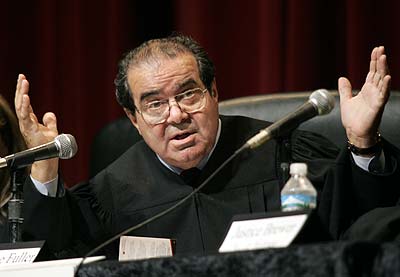The First Amendment:
Congress shall make no law respecting an establishment of religion, or prohibiting the free exercise thereof; or abridging the freedom of speech, or of the press; or the right of the people peaceably to assemble, and to petition the Government for a redress of grievances.The current debate about the federal government's right to design regulations concerning contraception and women's access to it suffers from a few misconceptions. These misconceptions are widespread. The GOP isn't reinventing the wheel of misinterpretation of the First Amendment, though it's painfully obvious that they've grabbed the mistaken view and run with it, suiting their purposes just fine.
For the sake of clarity, let's state at the offset that there is a contradiction in the phrases in the Amendment, known as the Establishment Clause and the Free Exercise Clause. One is slightly at war with each other, which opens the way to misinterpretation. "Congress shall make no law respecting an establishment of religion,..." is very clear. There shall be no state-adopted religion, which implies rather clearly that no religion may be favored. The result is that government must operate from a secular point of view.
When President Obama, through his Secretary of Health and Human Services, Kathleen Sebelius, issued the regulation that all businesses must offer insurance that covered contraception without co-pay, it could have been expected that there would be little controversy, since the regulations were similar to those in effect under the Bush administration and echoed the law in 28 states.
It's appropriate that churches and their affiliated activities that are directly connected to their congregations be exempted. Forcing churches to violate their tenets in the very course of the practice of their religion would be improper, although the Supreme Court had no problem banning peyote from Native-American religious practices. So there is precedent for criminalizing religious ritual (see Employment Division v. Smith). Justice Antonin Scalia, who wrote the majority opinion, saying that "To permit this would be to make the professed doctrines of religious belief superior to the law of the land, and in effect to permit every citizen to become a law unto himself." [my emphasis] And Scalia is a Catholic.
 |
| What's the big freaking deal? |
The Establishment Clause in the First Amendment makes it clear that the federal government may not apply the religious beliefs of Catholicism in crafting laws or regulations. That would violate the Establishment Clause. Here's how Wikipedia explains it:
The establishment clause has generally been interpreted to prohibit 1) the establishment of a national religion by Congress, or 2) the preference by the U.S. government of one religion over another. The first approach is called the "separation" or "no aid" interpretation, while the second approach is called the "non-preferential" or "accommodation" interpretation. The accommodation interpretation prohibits Congress from preferring one religion over another, but does not prohibit the government's entry into religious domain to make accommodations in order to achieve the purposes of the Free Exercise Clause.Clearly, then, the government has a right to ignore the canon law of the Catholic Church when issuing regulations. It can, however, accommodate the religious views of a church when it deems it prudent.
I think we can agree that requiring businesses that are operating in the public sphere and employing workers of multiple religious heritages to provide contraception without cost is well within the Constitutional prerogatives of the federal government and is in keeping with the Establishment Clause. A case can be made that the Constitution requires the Obama administration to take the position it originally did.
Obama then confronted the expected backlash from the Catholic Church, driven in large part by the U. S. Council of Catholic Bishops, by offering an accommodation: Catholic hospitals, universities, and agencies operating in the public sphere would not have to provide these preventive services to women, but all insurance companies would be charged with the obligation of including these services cost-free in all their packages, including ones purchased by Catholic hospitals and agencies.
This is very much in keeping with the Free Exercise Clause. Catholics can remain free of using or promulgating the use of contraceptives. Thus they avoid what, in their eyes, is sin. And women's health choices would not be weakened.
 |
| We're obviously quite a modern group, don't you agree? |
This wasn't good enough for the bishops, again not unexpectedly so. It is, however, the best the bishops could have expected. Even the head of the Catholic Health Association, Sister Carol Keehan, was satisfied:
The Catholic Health Association is very pleased with the White House announcement that a resolution has been reached that protects the religious liberty and conscience rights of Catholic institutions. The framework developed has responded to the issues we identified that needed to be fixed.In conclusion, Americans who understand their Constitution should all concur that President Obama hit the sweet spot between the Establishment Clause and the Free Exercise Clause. It's no wonder that the vast majority of Americans (and Catholics) agree.
 |
| Obama 1, Bishops 0 |
It's a crying shame that the bishops -- and, remarkably, the Republican Party and its presidential candidates -- are on the wrong side of this issue. Their misinterpretation and disregard for the First Amendment is very telling. The Republican Party may pay a price for such backward thinking. As for the bishops, a true-life good ole boys' club if there ever was one, they can take a hike. Their congregation, 98% of whom admit to using contraception at some point in their lives, already have.


No comments:
Post a Comment